DAVAO CITY (MindaNews / 15 June) — From the halls of Congress to online forums, statements and social media postings, even brief street protests, Mindanawons from various sectors have been voicing their opposition to the Anti-Terrorism bill, and through an open letter, appealed to President Rodrigo Duterte, a fellow Mindanawon, to veto the proposed law and commission a review to come up with a “version that is respectful of people’s rights and freedoms.”
“The best antidote to terrorism is building a humane Philippine society,” said the letter senders to the country’s first Mindanawon President and the first to claim to have Moro roots. Duterte on June 1 certified House Bill 6875 in the House of Representatives as “urgent” and it was passed on June 3. The enrolled bill is now in Malacanang and awaits his signature to become law.
Malacanang has asked the Department of Justice to submit its comments on the bill by June 17, Secretary Menardo Guevarra said.
“We’ll review the proposed anti-terrorism bill as independently and objectively as possible, with only the security of the nation and the civil and political rights of the people in mind,” he told reporters in Manila on June 13.
The 12-paragraph unity statement, written in Cebuano and translated to English, was read at the end of the “Barog Kalinaw, Katungod, Kagwasan” and “Tulay Kalinaw Mindanaw” online forums on June 12, the 122nd commemoration of Independence Day. It was first signed in Cagayan de Oro City by Archbishop Antonio Ledesma, SJ, the Archbishop of Cagayan de Oro and Charlito Manlupig, President and Chief Executive Officer of Balay Mindanaw Foundation, Inc. during the Tulay Kalinaw forum.
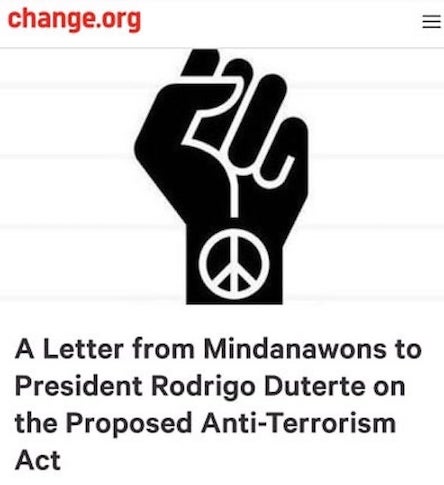 The letter has been passed around for signatures. And on June 13, it was uploaded to change.org for wider dissemination and to allow Mindanawons nationwide and in other parts of the world to sign up.
The letter has been passed around for signatures. And on June 13, it was uploaded to change.org for wider dissemination and to allow Mindanawons nationwide and in other parts of the world to sign up.
The Senate passed Senate Bill 1083 on February 26 while the House of Representatives, which adopted the Senate Bill, passed HB 6875 on June 3.
The long title of the bill is “An Act to Prevent, Prohibit and Penalize Terrorism, thereby repealing Republic Act No. 9372, otherwise known as the ‘Human Security Act of 2007’” while the short title is “Anti-Terrorism Act of 2020.”
Those opposing the Anti-Terror Bill in Mindanao support the fight against terrorism but disagree with the methods proposed by the bill, particularly on those that curtail civil and political liberties, as they also pointed to Mindanao experiences that have effectively countered terrorism.
The Open Letter said that having been sidelined by legislators who did not consult the people, “we now come to you and offer an alternative view about the proposed law, hopeful that truth and justice will guide your judgment on this crucial piece of public policy.”
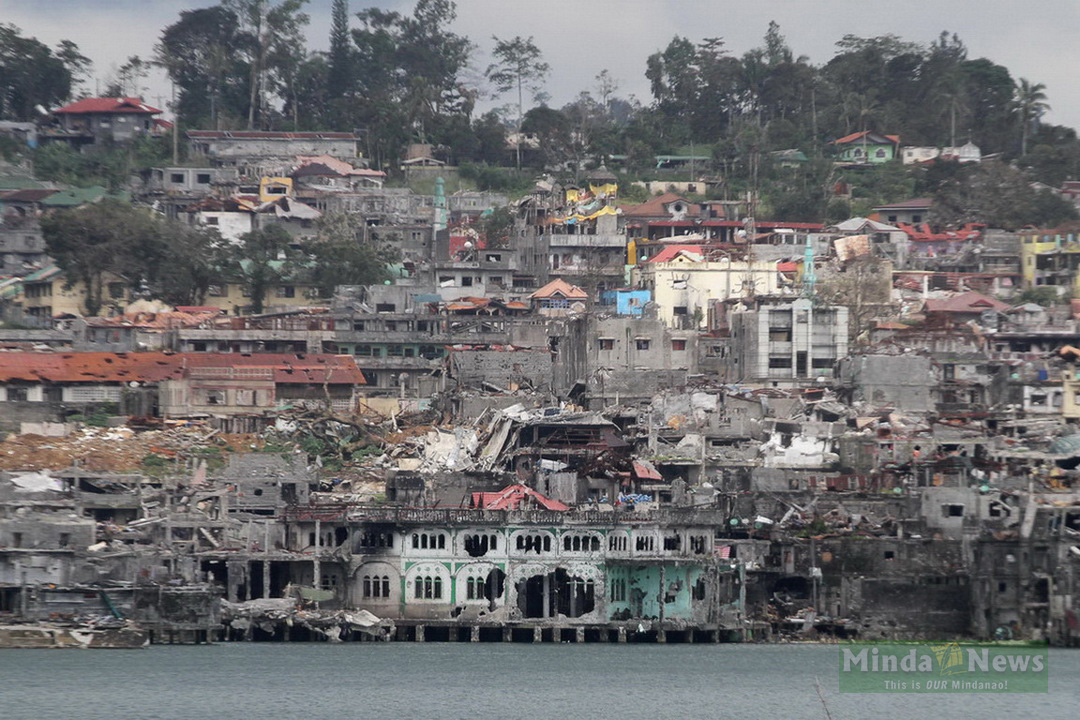 Buildings lay in ruins after the five-month battle to retake Marawi City from ISIS-inspired terrorists. Photo taken 24 October 2017. Three years later, residents of “Ground Zero” have yet to return home and rebuild their lives. MindaNews photo by MANMAN DEJETO
Buildings lay in ruins after the five-month battle to retake Marawi City from ISIS-inspired terrorists. Photo taken 24 October 2017. Three years later, residents of “Ground Zero” have yet to return home and rebuild their lives. MindaNews photo by MANMAN DEJETO
The letter senders said that like the President, they abhor terrorism and many of them have been active in various initiatives to stop its spread in Mindanao but experience has shown that the fight against terrorism is “rendered meaningless if, in the process, we curtail people’s civil and political liberties, the very hallmark of democracy.”
“Terrorists are out to impose their will on society hence, they abhor democracy. Aren’t we fighting terrorism to protect democracy as our way of life?” the letter senders asked Duterte.
Learn from history
The letter reminded the President that Mindanao’s history is replete with “tales of the pitfalls of disregarding human rights, even in the fight against so-called state enemies,” and atrocities committed against Moro civilians did not quell the separatist war in the 1970s “but cemented the Moro people’s perception of the government as barbaric, fueling their resolve to wage war and be freed from its clutches.”
The letter noted that after half a century of war, Moro secessionism was addressed by dealing with the underlying issues of social injustice, economic inequity, and political exclusion. The peace processes played a key role here and “needless to say, your administration contributed a big part to that resolution.”
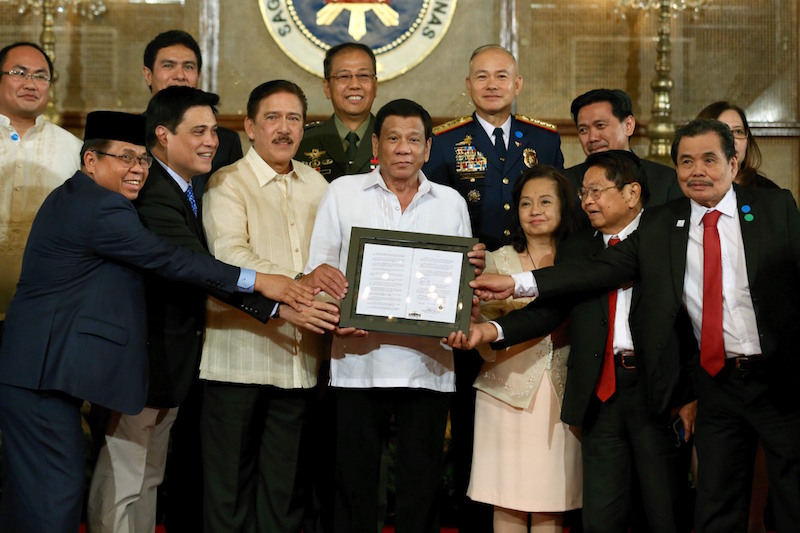 President Rodrigo Roa Duterte poses for a photo with the legislators and negotiators in the peace process with the Moro Islamic Liberation Front (MILF), as well as top officials from the Armed Forces of the Philippines and Philippine National Police during the presentation of the Organic Law for the Bangsamoro Autonomous Region in Muslim Mindanao to the MILF at Malacañang Palace on August 6, 2018. Richard Madelo/Presidential Photo
President Rodrigo Roa Duterte poses for a photo with the legislators and negotiators in the peace process with the Moro Islamic Liberation Front (MILF), as well as top officials from the Armed Forces of the Philippines and Philippine National Police during the presentation of the Organic Law for the Bangsamoro Autonomous Region in Muslim Mindanao to the MILF at Malacañang Palace on August 6, 2018. Richard Madelo/Presidential Photo
Under Duterte’s administration, the Organic Law for the Bangsamoro Autonomous Region in Muslim Mindanao (BARMM), the enabling law of the 2014 peace pact (Comprehensive Agreement on the Bangsamoro) was passed and signed into law in 2018 and ratified in 2019, leading to the establishment of the Bangsamoro region.
The letter said the same issues of social injustice, economic inequity, and political exclusion also underpin many other conflicts in Mindanao and the rest of the country and the suffering of the people in these areas, especially the Lumads (Indigenous Peoples), marginalized farmers and fishers, and urban poor has even intensified because of the COVID-19 pandemic.
“Taking all these lessons, we ask you, Mr. President, to veto the proposed law,” the Open Letter said, as it appealed to him to “please commission a review by the country’s legal luminaries, the security sector, and those with experience in dealing with the varied underpinnings of terrorism, in order to come up with a version that is respectful of people’s rights and freedoms.”
Theater of war
In a statement, Konsyensya Dabaw said apprehensions about the repressive and harmful practices that would be unleashed or heightened by the Anti-Terror Bill are legitimate as Mindanao is “the theater in which the latest campaign against terror and rebellion is being played out.”
“We are concerned that the implementors of the Anti-Terror Bill would target the ‘usual suspects’ and would go after Moro communities, indigenous peoples, and red-tagged groups, thus threatening the stability of the Bangsamoro peace process and further diluting ongoing efforts for the resumption of the peace talks between the government and the National Democratic Front,” it said.
It noted that there has been no comprehensive accounting of what was accomplished during the 31 months that Mindanao’s 27 provinces and 33 cities were placed under martial law, and “what the gaps were that would warrant another anti-terrorism initiative.”
Martial law in Mindanao ended on December 31, 2019.
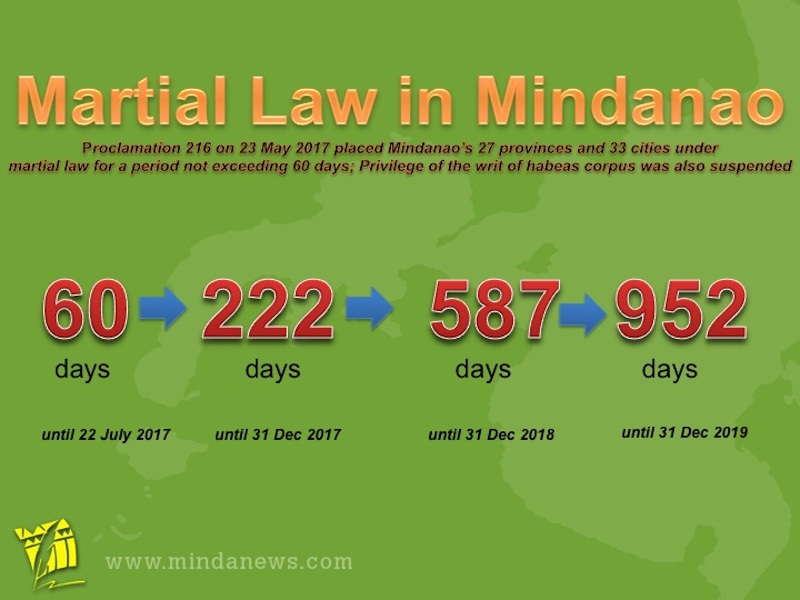
The President did not seek a fourth extension because, according to then Presidential spokesperson Salvador Panelo on December 10, security forces and defense advisers said “the terrorists and extremist rebellion have been weakened as a result of the capture or neutralization of their leaders; as well as there has been a decrease in the index crime.” (see other story)
Only 7% ideological; reform measures
In an online forum of the Institute for Autonomy and Governance on June 10, Basilan Representative and Deputy House Speaker Mujiv Hataman, said the bill will not end terrorism but worsen the situation.
He reiterated what he said during the voting on June 3 that the law provides only a paragraph on preventing and countering terrorism.
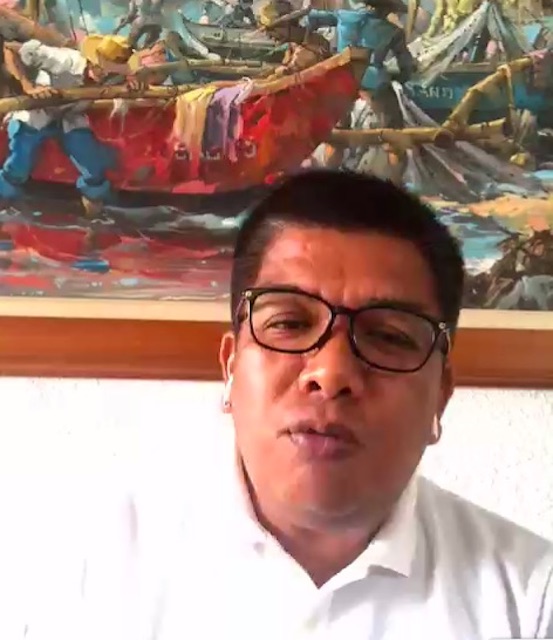 Basilan Rep. and Deputy Speaker Mujiv Hataman during the online forum, “Usaping Anti-Terrorism Bill” on June 20, 2020. Screengrabbed from IAG forum
Basilan Rep. and Deputy Speaker Mujiv Hataman during the online forum, “Usaping Anti-Terrorism Bill” on June 20, 2020. Screengrabbed from IAG forum
Hataman, who served as governor of the Autonomous Region in Muslim Mindanao (ARMM) from December 2011 to February 2019, said countering terrorism is not only through the use of guns or through arrests but, as experience has shown, can be done through development, dialogue, caring for the communities, education to raise the level of consciousness of the youth and prevent them from being easy preys of recruiters.
“These reform measures are among the pillars of counter-terrorism,” he said.
As ARMM governor, he said, they had successful programs against terrorism, in coordination with security forces and religious leaders, civil society organizations and local government units.
Hataman stressed only a very small percentage of those who join extremist groups are there for ideological reasons. He cited as example that out of 214 Abu Sayyaf members who surrendered in Basilan, only 7% joined the group for ideological reasons but 93% did so for security reasons, poverty and injustice.
Bangsamoro Member of Parliament Zia Alonto Adiong said solders during the Marawi Siege told him that the young members of the Maute Group were promised 15,000 pesos every month to undergo training.
The rehabilitation of Marawi, he said, should have been prioritized as the ongoing narrative of neglect can be exploited by extremist groups.
Hataman said government prioritized the anti-terrorism bill instead of the compensation bill for Marawi that would have helped prevent recruitment of the vulnerable sector by terror groups.
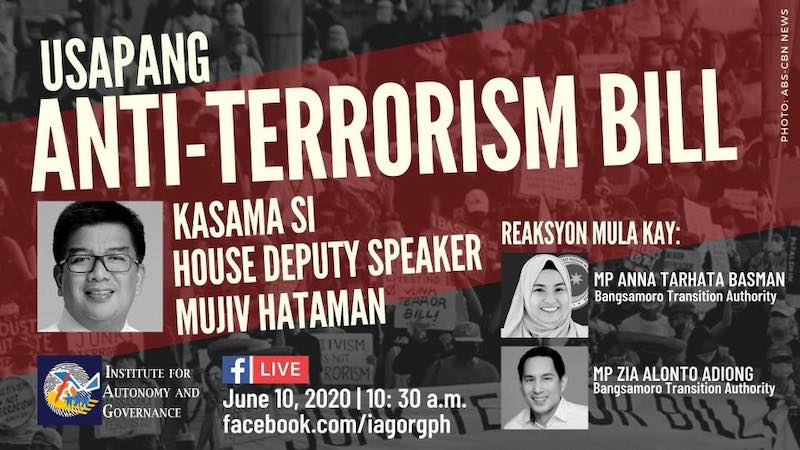 MP Anna Tarhata Basman, who also spoke in the forum, said she grew up in fear everytime there was a report on bombings in Metro Manila as the next news would be Moro communities being raided and evidences planted in the homes while the males were rounded up, detained, some of them even dying in prison.
MP Anna Tarhata Basman, who also spoke in the forum, said she grew up in fear everytime there was a report on bombings in Metro Manila as the next news would be Moro communities being raided and evidences planted in the homes while the males were rounded up, detained, some of them even dying in prison.
She said they live in constant fear that “anytime pwede kang masuspetsahan and masira ang buhay mo” (you can be suspected and your life will be destroyed).
“Usual Suspects”
Officials of the BARMM have yet to make known their stand on the Anti-Terror Bill. MindaNews sought Bangsamoro Chief Minister Ahod “Al Haj Murad” Balawag Ebrahim for comment on Sunday. He said he was in a meeting and would send his reply later. He has not sent his reply despite a follow-up on Monday.
The minority bloc in the Bangsamoro Parliament, however, has been on the forefront of the campaign against the anti-terror bill and has in fact submitted a proposed resolution for consideration of the Parliament when it resumes sessions on June 16.
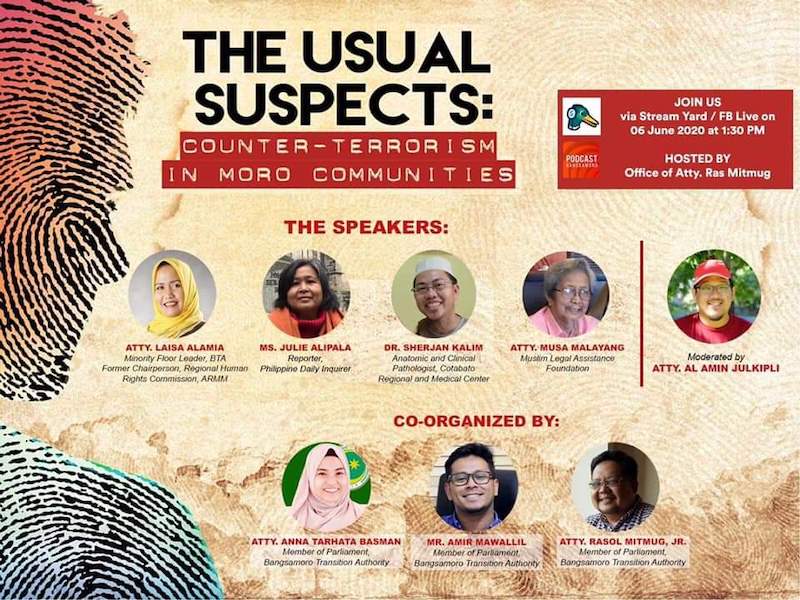
Three young Members of Parliament (MPs) – lawyers Basman and Ras Mitmug and writer Amir Mawallil – immediately initiated a forum on June 6 – three days after the House voting, titled “The Usual Suspects: Counter Terrorism in Moro communities.”
“We can argue that it is Muslim communities that have been hurt the most by terrorism in this country—and Muslim communities who will likewise suffer under overreach and abuse in the zeal to counter terrorism,” Basman said.
The nearly three-hour forum, featured an elderly Moro human rights lawyer, a young pathologist from Cotabato City, a journalist from Zamboanga and the Minority Leader of the Bangsamoro Parliament who shared experiences of actual cases before the Human Security Act of 2007 was passed and while under it.
Lawyer Musa Malayang recalled how they set up the Muslim Legal Assistance Foundation (MusLAF) in 2005 following a raid in Manila where 18 Moro residents, a number of whom were teaching Islam, were arrested allegedly for engaging in terrorism. The cases were later dismissed.
He said Moro residents in Zamboanga and Cotabato and other parts of Mindanao who were suspected to be terrorists were arrested and detained but transferred to Manila as government prosecutors sought transfer claiming the trial in Mindanao courts might be attacked. He said most of the cases were either dismissed or the persons charged were acquitted.
Malayang hopes the younger lawyers would organize an organization similar to MusLAF to ensure they can help their Moro brothers and sisters, particularly if the anti-terror bill is signed into law.
Journalist Julie Alipala recalled how she was bashed and accused of being a supporter of terrorists when she wrote about the massacre of seven persons in Sulu in September 2018 who were allegedly Abu Sayyaf members but who turned out to be civilians. Harvesting fruits. She also cited the case of a driver of a “habal-habal” (passenger motorcycle) in Zamboanga City who was repeatedly arrested allegedly for being an Abu Sayayf member.
“Lived realities”
Dr. Sherjan Kalim, a pathologist at the Cotabato Regional and Medical Center, stressed that detainees must have access to doctors and doctors must have access to detainees. But he also noted how some doctors, fearing for their lives, ended up not writing down that the detainees they examined actually suffered physical injuries.
He said the common signs of torture are evident but they learned that those who inflict harm have found new ways to torture without leaving physical evidence, such as using electricity in the scrotum area of male detainees.
MP Laisa Alamisa, the Minority Leader, said she hopes the rest of the Filipinos understand what the bill means for the minorities in the country — “for us Muslims in the Bangsamoro, including the Indigenous Peoples” given the context of Islamophobia, stereotyping, and Muslim profiling that are still prevalent in the country.
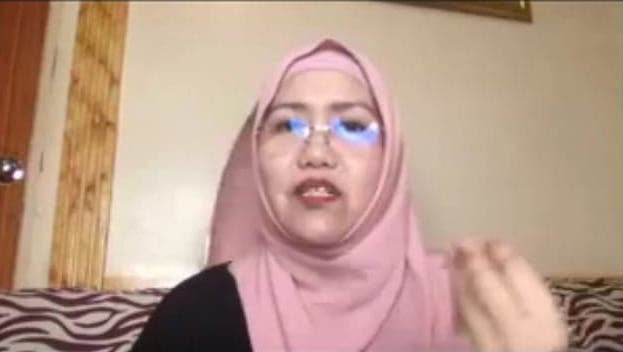 Bangsamoro Member of Parliament and Minority Leader Laisa Alamia explains her position paper on the ANti-Terror bill during the forum on “The Usual Suspects: Counter-terrorism in Moro Communities” on 6 June 2020. Photo screengrabbed from online forum
Bangsamoro Member of Parliament and Minority Leader Laisa Alamia explains her position paper on the ANti-Terror bill during the forum on “The Usual Suspects: Counter-terrorism in Moro Communities” on 6 June 2020. Photo screengrabbed from online forum
“No regard for human rights will not and cannot win the ideological battle against extremism,” Alamia said, adding it could even drive more people into violent extremism.
She said Moro communities have always “fallen victim to both sides – terrorists and state enforcers.”
Mawallil said that as Moro people, they have apprehensions on the bill because of their experiences, of their “lived realities,” of wrongful arrests, mistaken identity, among others.
Moro lawyers
At the end of the June 6 forum, a statement of Moro lawyers and law students rejecting the anti-terror bill was read, stating that “if there is anybody in this nation who vehemently desires to put an end to terrorism, it is us – Moros.”
“As Moros we know its ill effects too well. We have suffered from them. We have seen the destruction of our own homes in Marawi. We have lost loved ones in bombings. We have been forced to flee many times, not only at the ear-shattering sound of gunfires and shelling, but at the faintest footfall of combat boots and rumbling of tanks. As children, we have learned that silence is safety. As adults, some of us have learned to fear both black flags and fatigue uniforms in equal measure,” the statement read.
But it added that they also know too well that “overzealous desire to capture the enemy, when sanctioned by law that is bereft of any procedural and substantive safeguards to protect the innocent, is just as dangerous to our lives, liberties, and freedoms.”
Moro lawyers in Zamboanga-Basilan-Sulu-Tawitawi (ZamBaSulTa) also issued a statement condemning terrorists and said they “fully support the counter-terrorism measures” of government but express “our strong opposition to the Anti-Terrorism Bill … which can greatly prejudice human rights and civil liberties.”
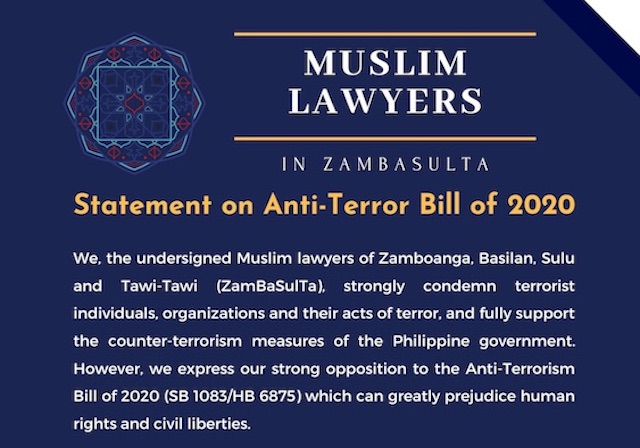 “We are too familiar with the unspeakable terror caused by extremists upon our people, our infrastructures and the economy, and it is but the State’s right and duty to protect its citizens. But the ends should never justify the means,” it said as the bill’s intent of preventing terrorism is “overshadowed by its own constitutional infirmities.”
“We are too familiar with the unspeakable terror caused by extremists upon our people, our infrastructures and the economy, and it is but the State’s right and duty to protect its citizens. But the ends should never justify the means,” it said as the bill’s intent of preventing terrorism is “overshadowed by its own constitutional infirmities.”
Terrorism, the lawyers said, “can be thwarted without losing our human dignity and disregarding human rights.” (Carolyn O. Arguillas / MindaNews)
